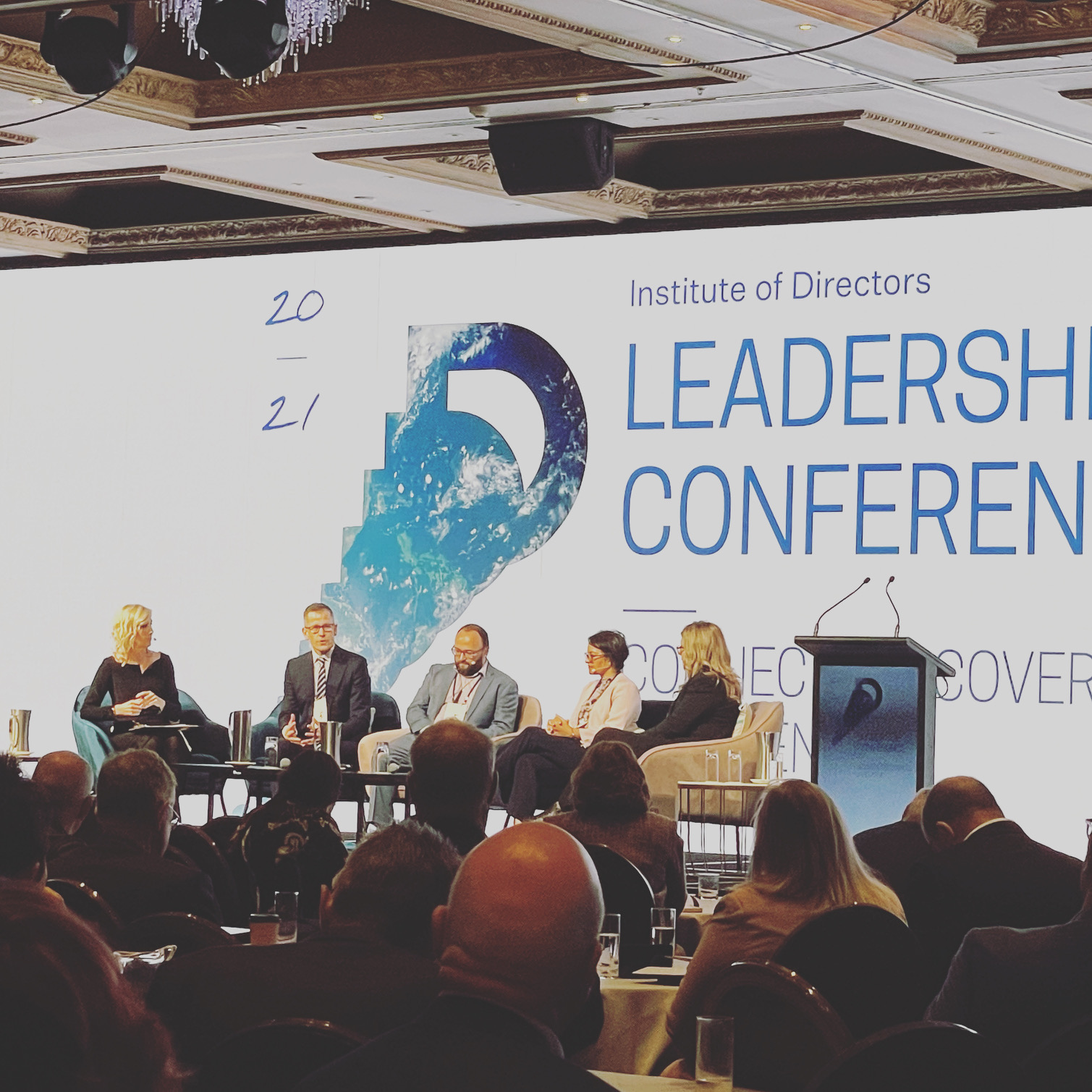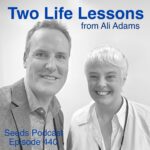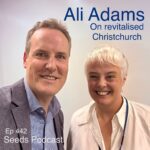The key learnings and a summary from the first day is here. On the second day there were a lot of other topics covered so here is a summary of the sessions that I attended outlining the key points made, any relevant resources and a reflection for each session.
The intent here is that this may be of interest to those of you who were not able to attend and also a good refresher for those of you who were there, or who attended different break out sessions.
I welcome connecting on LinkedIn with you all here where I try to post interesting/challenging content – let’s keep the conversations going! Also, seeds podcast now has 250+ interviews with inspiring Kiwis and many Directors, Entrepreneurs and Leaders that deep dive into their lives and what motivates them in all podcast apps or have a browse on this site …
Breakfast panel on Not for Profit perspectives with Alan Isaac, Carol Scholes, Brent Impey and Mark Connelly
Summary: NFPs have lots of unique challenges – how will they adapt, overcome and thrive?
Overview: Discussion was very wide ranging. Started on board diversity and how difficult it is to withstand internal politics and agendas. People may join in good times but need to be just as committed in the hard times. Sometimes boards leaned on to supplement management not having enough support at management level for the CEs is really important, otherwise Directors may get too involved in management. It is through crisis which shows what you are in denial about. Covid exposed the weaknesses that were always there. But how do we go from that to just slipping back into the old ways and not allowing transformation to really happen? Why do we act on NFP boards – because it is a way to give back and to lead with our hearts, there is more than money involved and that’s vitally important. But bearing in mind that charities employ a large number too. What we need more of is this: collaboration. If business talks about collaborating then shouldn’t charities also do so, and actually do it?
Key Resource: IOD have produced a great resource for NFPs – a hub of information which can be found here. Description of the Overview Effect and training for NFPs here. Last year I was involved in preparing a short paper on the future for NFPs and issues here and the 7 hard questions they should ask, written with Craig Fisher so sharing as it relates to these themes and regarding collaboration there are sector wide zoom calls every two months, described here.
Reflection: This conversation went in a few different directions that I hadn’t expected around diversity and also the dangers associated with making tough calls and the personal accusations that can flow. It was a good reminder that we all have a heart and supporting NFPs is vital in so many ways.
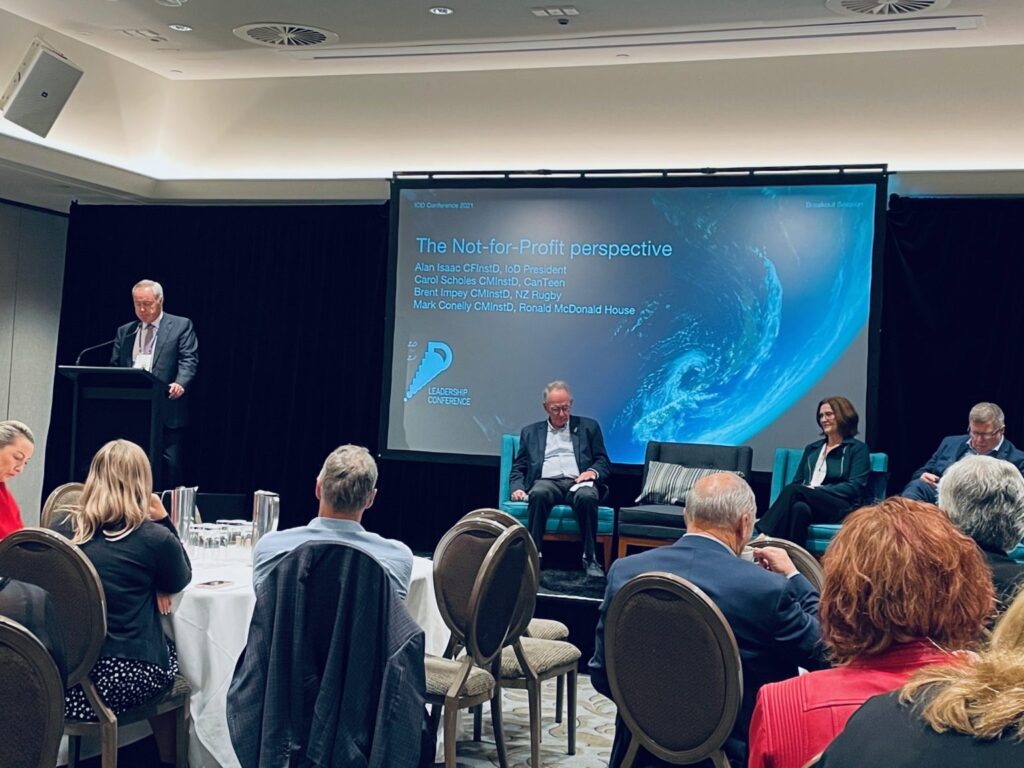
Professor Colin Meyer on Purpose
Summary: Companies need to determine and embed purpose in the business. We need to enshrine that better and he described a way to do so.
Overview: If we agree purpose is important then we need to take steps to do this. Increasingly we are moving away from Milton Friedman philosophy about profits being the main reason for business – in fact there is a much larger picture. To determine purpose (finding commercially viable ways to solve problems) they have developed a framework – SCORE – to do this, which stands for the following:
- Simplify down to understand what the purpose is.
- Connecting purpose to core of business activities and strategy and other stakeholders.
- Ownership of the corporate purpose and the culture being aligned with purpose,
- Reward system of business that it walks the talk about success of delivering the purpose,
- Exemplify the company purpose and show how it is meeting the purpose to show authenticity and challenges and failures too.
The purpose of business is about profitably solving problems – if we embrace that idea, there are implications of how we act. Patient capital is critical too. If done well this inspires employees, next generation and stakeholders who trust companies.
Key Resource: Next on my reading list for sure – his book is called “Prosperity: Better business makes the greater good” here.
Reflection: I was inspired by this talk which is not said lightly as this is the area I work most in, helping purpose driven entrepreneurs on their legal structures – I think what he said was so logically expressed and grounded that it had real impact. What next?
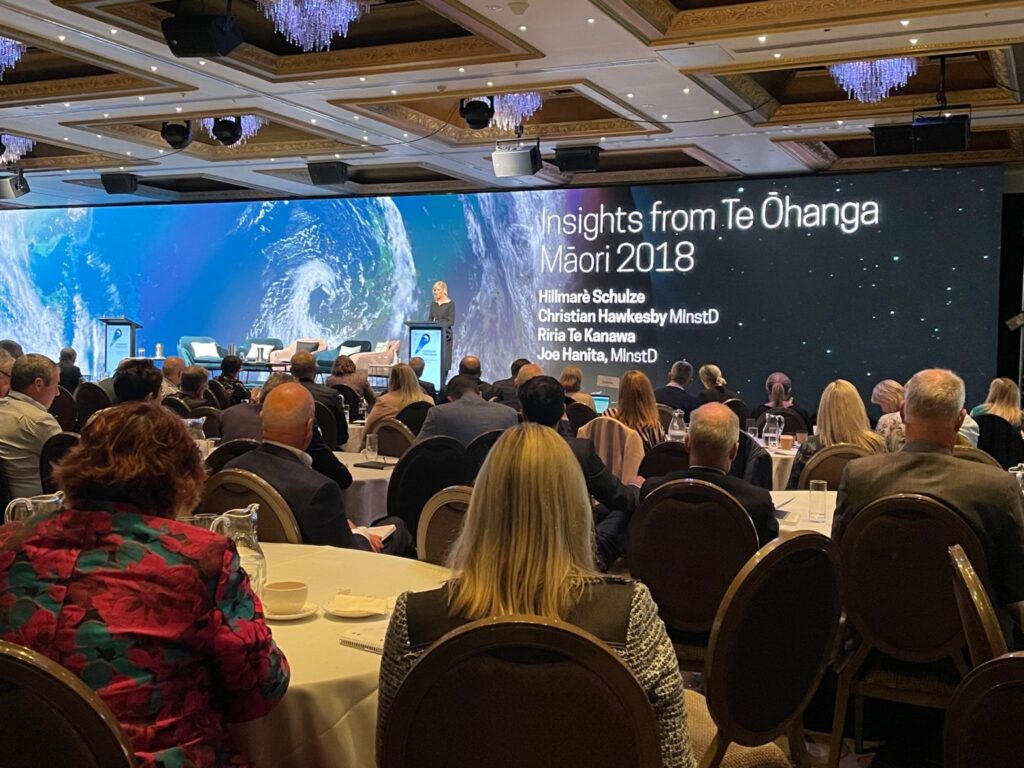
Discussion on the Māori economy with panel of Hillmare Schulze, Missy Te Kanawa, Christian Hawkesby and Joe Hanita
Summary: The Māori economy is growing in importance and we need to recognise it but also be aware of and welcome the different perspectives that the deeper foundational values could bring to our Boards.
Overview: Started with a summary from BERL Chief Economist Hillmare Schulz and description of the Maori economy “you have a three year business plan, I have an infinite purpose”. Panel discussed the many values that come from Te Ao Māori. Boards need to be aware of these concepts (manaakitanga, kaitiakitanga, tikanga …) which will inform our futures – and properly integrate it into the Boardroom. There are many regional initiatives which are vibrant and bubbling up so there is good hope for the future. For SMEs how do we think about procurement and who it is that we receive good and services from? Need to create awareness of importance of Māori economy so it is part of conversation and structure going forward. Go beyond ‘inclusion and diversity’ and recognise the value that other perspetives can bring – actually value them. How do we define value? A combination of sustainable profitable business but not at the detriment of our natural world. Importance of maintaing own identity as well in the midst of business. Build back from values as foundation to then start businesses. True partnership means we really listen – not tokensim or ticking the box, but co-thinking – not shaping up and after that bringing it after plan is done for comment. Open up to options you may never have thought of to go to a new place together – that is partnership. Together – but from the beginning. Need to start with empathy and conversation and really listen.
Key resource: Report on Maori economy by BERL “Te Ōhanga Māori” is here. I did an article on some of these concepts on what business can learn from Te Ao Māori for Spinoff with Wayne Tukiri here.
Reflection: Encouragement to start with an open mind and have conversations from the beginning rather than taking a plan to seek input after it is done. What might boards look like if they truly seek to understand Te Ao Māori? Let’s at least start talking…
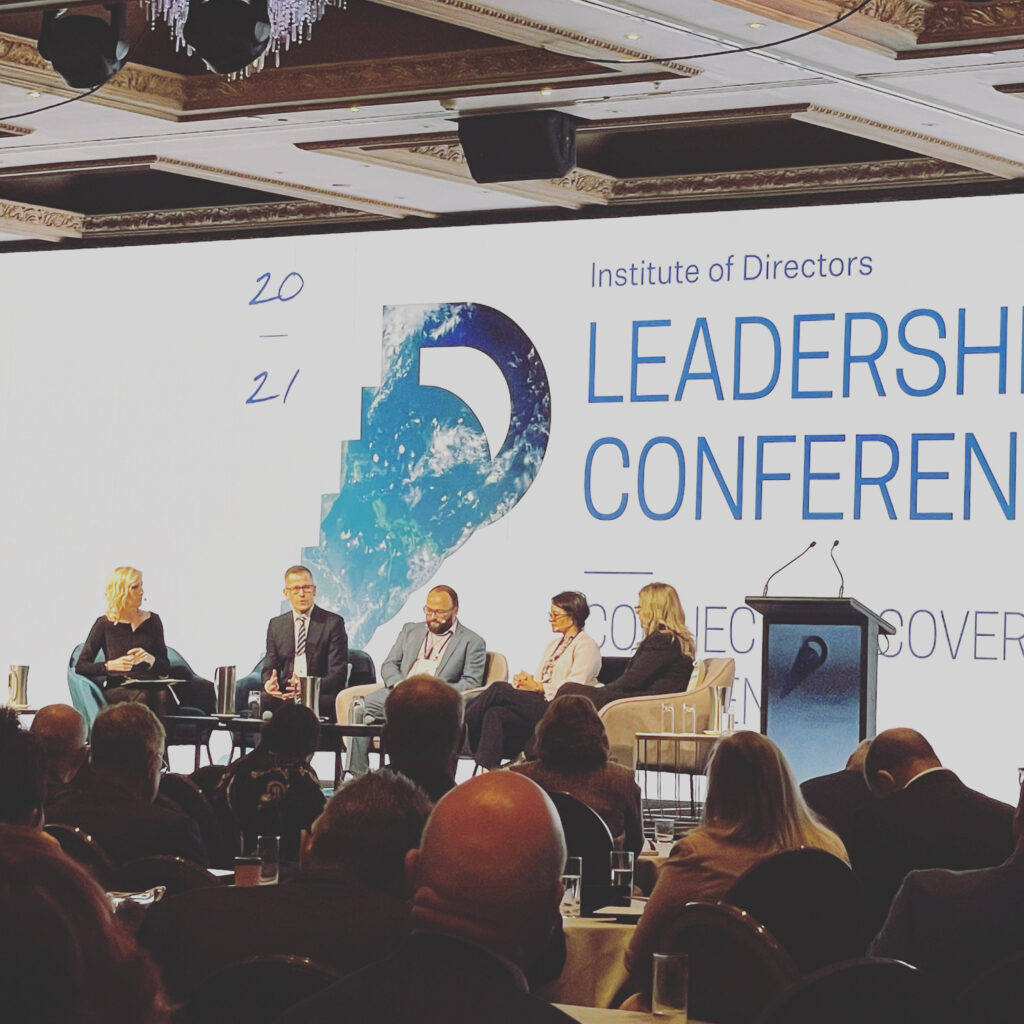
Panel session on Innovating for Impact in the Not for Profit sector with Patrick Gamble, Liz Gibbs, Maria English, Minnie Baragwanath and Murray Edridge
Summary: Discussion of how NFP can leverage change for increased impact, and the value of measuring impact.
Overview: Many changes in technology and society but still many needs – how do NFPs use what they have to do things differently for greater impact. Needs in the sector include training for governance, education and impact measurement. IOD and Perpetual Guardian have collaborated to create a new training module for governors of NFP described here. Need to focus on innovation but do so by consdiering the words “context” and “courage” – organisations need to adapt to context of today. What if we are allowed to try things – and fail? Giving such leeway could lead to greater innovation. What is the impact we want to have – and how do we know if we are having it? We need to consider and prove the claims made about impact. If the stick is compliance then the carrot is the opportunity for greater impact… Having data shifts conversation from cost and how we cut them, to impact and how to increase it. Data helps surface the unkowns which allows you to then make better decisions. As we go about the work in NFPs and other groups, are we designing and innovating a truly accessible future for all? Think of the 1 billion in the world with some form of access need. Move from thinking about disability to accessibility to possibility… think about the future too in context of “possibility” and how we conceive the world around us. “Possibility focuses on what we want our future to be as opposed to problem solving”… maybe charities need to create their own funding bases to fuel innovations. Invest in possibility not play it safe.
Key resources: IOD NFP Governance Hub, Impact lab here, Perpetual Guardian here, Global Centre of Possibilty website is here. Aotearoa Impact Sector Update calls – summary here and free guide for charities here.
Reflection: NFPs are critical to our society – we need to help them innovate so appropriate to their context, but also measure impact. (But also – isn’t a better description the “For Purpose” Sector? Why do we frame it by reference to business/profit?)
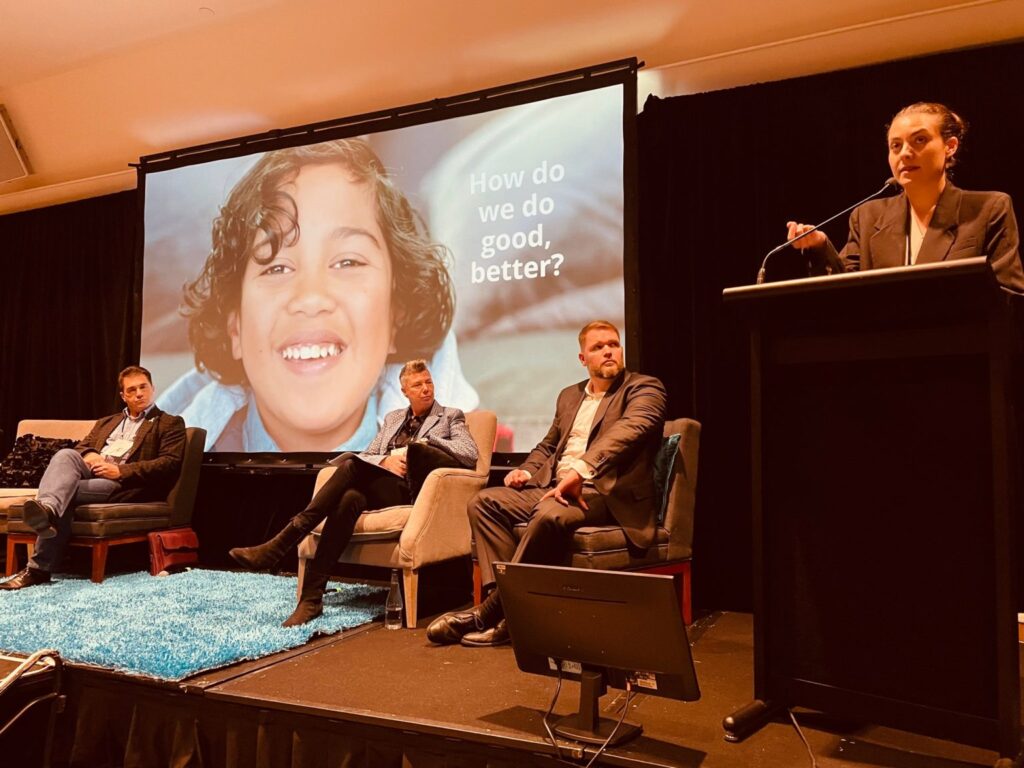
Panel on The Future of Media with Sinead Boucher, Jon Duffy, Fran O’Sullivan, Rachel Smalley
Summary: Technology has disrupted media with the vast quantity of media sources meaning a lack of trust can result.
Overview: Social media has impacted media including by responses to anything you write. Trust in media and what is read has dropped – yet media is there to serve a purpose too around giving information. How to build back trust in media? Give context on reporters, make clear how ethics work to the readers. Speed of news media means live reporting happens right away rather than delay. Models are evolving to fund beyond advertising to eg stuff fibre, and the public can contribute to Stuff. People are used to not paying so need to break consumer behaviour which is not an easy task. What value does Facebook and others actually offer advertisers? Consider advertising with media providers. By stopping use of Facebook, Stuff has seen very little impact on views, and less dealing with trolls. So – is Facebook really that important to consider? There may be too much talking past each other and not debating. How about public media – important role but need private advertiser/subcription/donor driven too. Insightful journalism can be tempted to descend to sensationalism – but real journalism can probe and challenge what the sensationalism is and what they are doing and hold to account eg Covid conspiracies.
Resource: On media as a social enterprise and public interest journalism this may interest from Media Watch.
Reflection: Fascinating discussion and perhaps public funding should increase for media? It is too hard to predict what 20 years may hold as remember how different it was say 20 years ago.
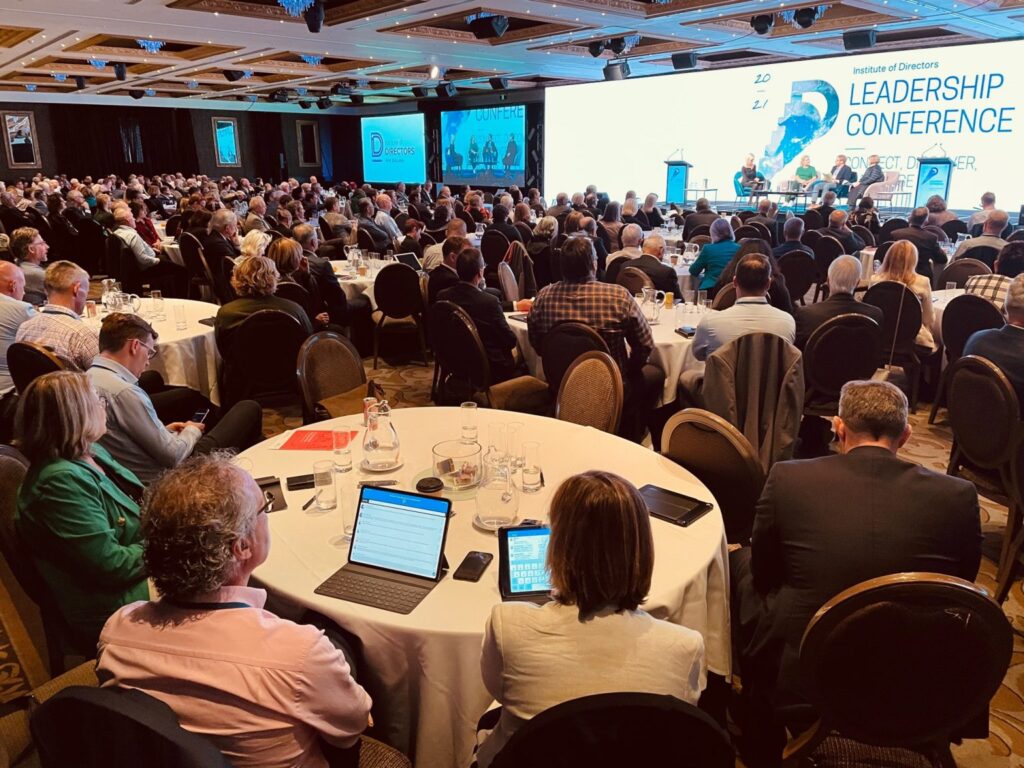
Earl Eddings on Cricket Australia
Summary: Dealing with ‘sandpaper gate’ and what flowed from that.
Overview: Many lessons learned – don’t sweep things under the carpet. Listen – go out and talk with critics, talk with sponsors and media, opportunity to reset the culture of the team – play with humility and not win at all costs. Actions not words – the only way to try to get trust back. Own the problem and then fix it. Start up strategic partnerships to counter the issues. Move to be clear on purpose eg ‘Cricket as sport for all Australians’ so affects what you then do eg how reach out to indigenous people in Australia.
Reflection: Negative events can be used to reinvigorate an organisation. Key is to take responsibility and work from that point – cover ups can be worse than the crime.
Caren Rangi with fast facts on the Pacific
Summary: The Pacific perspective needs to be considered.
Overview: Four fast facts and a challenge:
1. New Zealand is a Pacific nation – so do you have Pacific views embedded in your strategy? Are you listening to those voices too?
2. On a mission to increase Pacifica governors – make space for discussing more – come and talk if you want to know more.
3. The Pacific has governance practices to contribute eg Waka model can provide different perspective.
4. We need to strengthen governance through more training on what it is to be a good director.
The challenge: How can you make space for a Pacifica board member?
Resource: Short description of Caren’s journey here – why not reach out to her on LI here to discuss who could join your board? Also – why not visit the beautiful Cook Islands?
Reflection: Great reminder of the place of New Zealand in the Pacific … and shouldn’t the composition of boards reflect that?
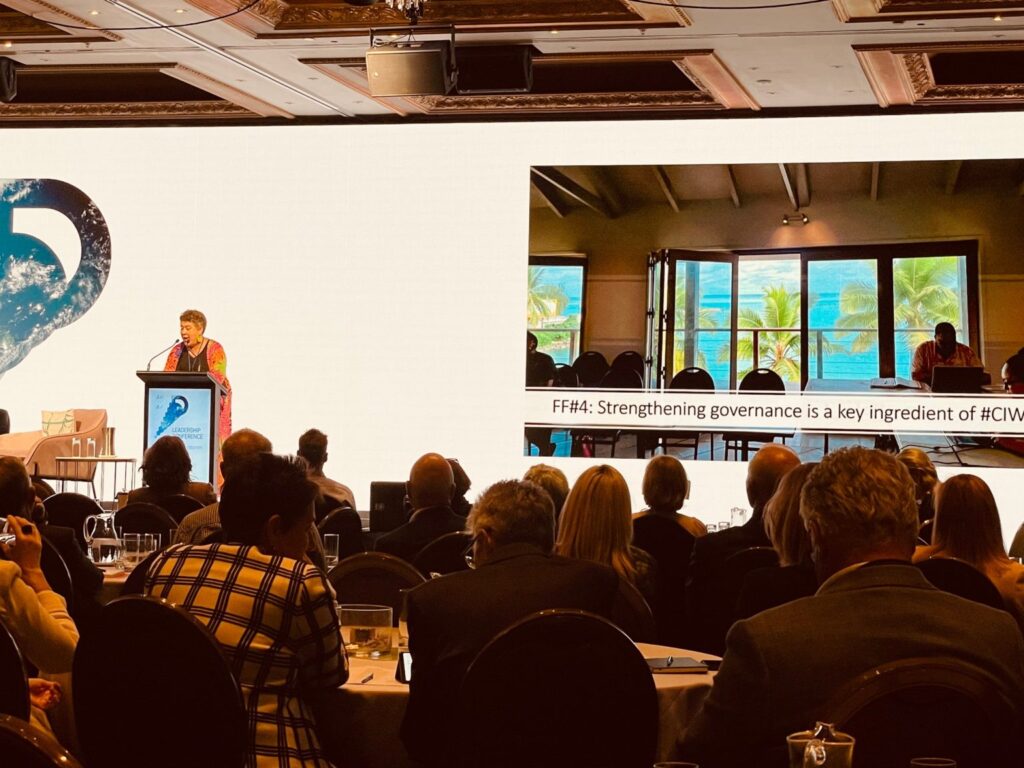
Perspectives on a path forward with Rob Campbell, Patrick Strange, Justine Smyth
Summary: Panel talking about the letter sent by business leaders at the start of lockdown calling for cohesive strategy and response to Covid. What worked? Where to?
Overview: Our political system doesn’t adapt quickly – new Ministers arrive and the people there to help were appointed many Ministers before so it’s hard to implement change. Perhaps bureaucracy itself needs transforming. In a more physically distant world the role of technology will be an enabler but we need to focus on innovation for a true recovery. Business also has an issue to articulate the role it plays more clearly. We need to stand up and be counted – some didn’t want to sign letter. Do we succeed if we go back to the way things were? No … So how do we tap into community to discuss as well? Rather than looking for good models overseas why not develop our own. More decisions and discussions needed in the open and not behind closed doors. What if Government had written an open letter back to the business leaders responding?
Key Resource: An article in Stuff here describing letter sent for context.
Reflection: Need to engage many across community at grass roots not rely on politicians for true change.
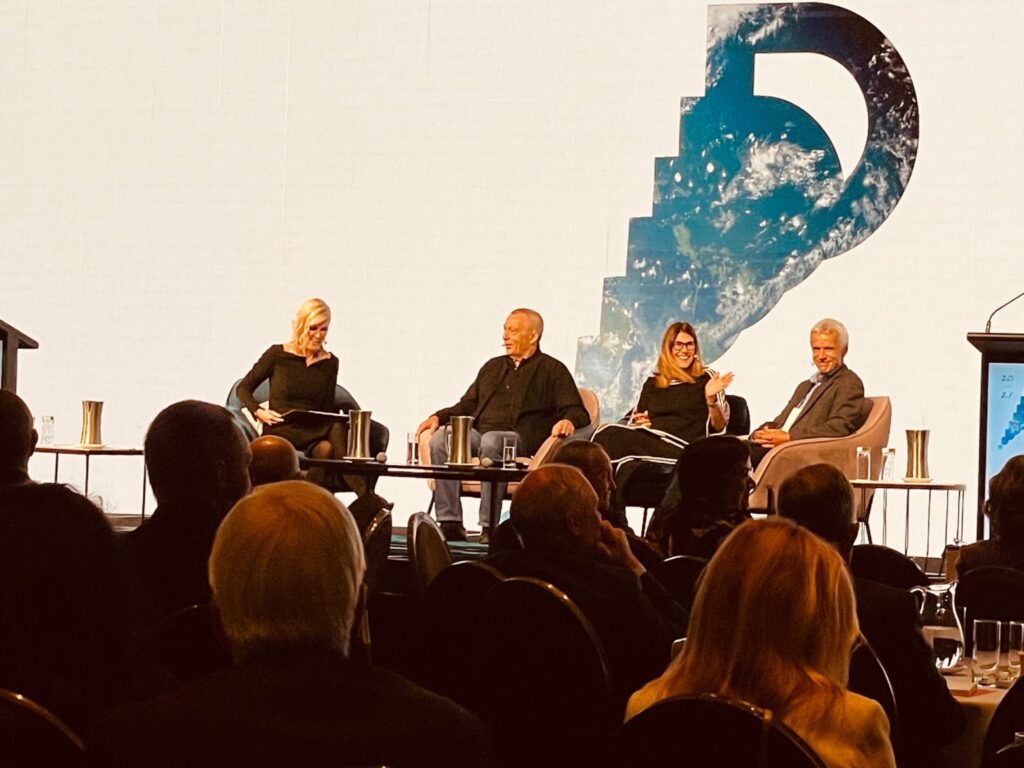
A conclusion (… or, a beginning?)
In her conclusion Kirsten Patterson asked those of us attending to “share the lessons”. So how can we do that as many who were not in the room could learn too. Hopefully this summary is one way as it is just one person’s perspective on the day but would be easy to pass it on to others who were not there too.
There were many challenges to talk about but the recurring theme was this: Covid revealed weakness, strengths, new ways, old habits – how do we individually and collectively not fall back into the old rhythms which even now are calling us. Will we look back with regret on our missed opportunity to truly reset or with satisfaction that we were able to do so. I hope we can.
Steven Moe
Partner, Parry Field Lawyers
stevenmoe@parryfield.com
021 761 292
Other free resources:
Doing Business in New Zealand Guide

